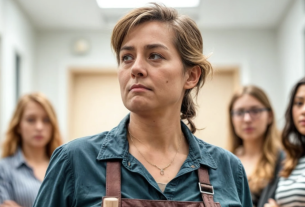I was standing by the table, cluttered with the remains of festive dishes, and I could feel goosebumps running down my back from all the shared merriment in which there was no place for me. My fingers were unconsciously playing with crumbs on the tablecloth, and my gaze was fixed on Irina—my new mother-in-law. Beaming, she kept adjusting the massive, glittering necklace on her neck and scattering to the right and left her dazzling, perfectly rehearsed smiles. Smiles that never reached her cold, appraising eyes, always busy tallying other people’s mistakes and measuring other people’s worth against her own yardstick.
“Anna, my dear,” her ringing, piercing voice sounded, making a couple of guests turn around, “are your dear parents still on their way? From their sweet, such a very far-off little town?”
I just nodded silently, swallowing the lump rising in my throat. Mark, my husband, whose last name I now shared, was standing on the other side of the hall next to his father. He was staring intently at something in his glass, not lifting his eyes in my direction, as if there were an invisible but insurmountable chasm lying between us.
“Well then,” Irina said with a theatrical sigh of regret, picking up an empty plastic container from the edge of the table and gracefully filling it with leftover salads and cold appetizers, “take this. Give it to your mom and dad. Since they couldn’t share our happy day with us, at least let them try our delicacies. Or do they not have the money for such small pleasures?”
The neighboring table responded with restrained, nervous laughter. Sergey Petrovich, Mark’s father, grunted approvingly, putting his hand on his son’s shoulder.
“There’s plenty of food, no reason to let good things go to waste. We’re not proud people, we’re simple folks, we appreciate what we have.”
I reached out and took the container. The plastic cracked under my fingers, almost bursting from the tension. Every fiber of my being was yearning to hurl that contemptuous gift onto the floor, to smash it to pieces along with this humiliating mask of politeness. But I simply set it back on the table with a quiet tap and moved away to the large window, beyond which evening was slowly descending, wrapping the city in its indifferent, dusky blanket.
Mark came up to me only half an hour later; he smelled of expensive sparkling wine and a light, carefree euphoria that stood in such sharp contrast to the storm raging inside me.
“So why are you sulking like this? Over such nonsense? Over a couple of careless remarks?” His voice sounded tired and irritated.
I looked at him and suddenly realized with horror that I didn’t recognize the person standing in front of me. We had been together for two years. He had spoken soft words full of warmth and support, sworn that I was his air and his rock. And now he was looking at me as if I were a spoiled child throwing a tantrum over a toy she hadn’t been bought.
“Your mother publicly humiliated me in front of all our guests. And you just stood there and kept quiet. You didn’t say a single word in my defense.”
He only shrugged, looking away toward where his friends were laughing.
“That’s just how she is, it was a joke. She didn’t mean anything bad by it. You know that, don’t you? You’ll get used to it, it’s nothing.”
“I’m not going to get used to open rudeness and disdain. I won’t let anyone treat me like that.”
Mark winced as if his head had started to ache.
“Anna, I’m begging you, don’t make a scene. Not while the guests are still here, it’s awkward. Calm down.”
Silently, I took my phone out of my dress pocket. My fingers were trembling, but I found the right number and dialed. The line rang.
“Dad,” I said when the call was answered, “can you come over? Right now. I need you to be here.”
A pause. Then his calm voice, the same one I’d heard all my life:
“We’re on our way. We’ll be there in forty minutes.”
My parents arrived exactly when they’d promised. Their modest foreign car quietly pulled up to the entrance. They walked in—Mom in her simple but elegant dress, Dad in his usual jacket. No pomp, no showy sparkle. Just a quiet, unbending dignity. Irina ran her sharp, appraising gaze over them from head to toe and quickly whispered something into Sergey Petrovich’s ear. He just smirked in response and nodded.
I rushed to my mother and hugged her, breathing in her familiar, calming scent. My father looked straight into my eyes with his steady, calm gaze and nodded without words, as if saying: “It’s all right, daughter. We’re here.” I led them to the table, to the center of this celebration that had turned into a trial for me.
“Oh, at last we’re all together!” Irina exclaimed, clapping her hands. “We thought you’d gotten lost in our urban jungle! Was it a long trip from your sweet little town?”
My father calmly held out his hand to Sergey Petrovich.
“Viktor.”
The other man shook it with exaggerated condescension, as if doing him a favor.
“Sergey. A pleasure. You work somewhere, Anna said?”
“In construction.”
“Aaaah,” my father-in-law drawled, exchanging a meaningful glance with his wife. “Construction, that’s respectable. We’re practically in that field ourselves. We do facade renovations, work with government contracts. Our firm is StroyLux. You’ve surely heard of it?”
My father slowly shook his head, without the slightest hint of embarrassment.
“No, I haven’t had the occasion.”
Sergey Petrovich grimaced as if he’d bitten into something sour.
“We have solid clients, a serious turnover. And you’re on a site, you said? A foreman, I suppose?”
“Something like that,” my father replied with a faint smile.
Meanwhile Irina had scooted closer to my mother, wrapping an arm around her shoulders with ostentatious familiarity.
“Forgive us for taking your girl away like this. But young people need help, we understand that. We registered the apartment in their names, did the renovation. Anna, after all, didn’t have a place of her own, always renting. But that’s nothing, the main thing is she’s a good person, we don’t care about material things.”
My mother listened in silence, looking at her with her quiet, wise eyes. She said nothing, just looked, and in the end Irina herself dropped her gaze under that calm, all-seeing look.
Unable to bear the pause, Sergey Petrovich continued his interrogation:
“As you can see, we’re well-off people, we can help the kids, support them. And how about you? Things must be tight with money in your neck of the woods, I imagine?”
I crushed the paper napkin in my hands until it became a crumpled ball. Mark sat staring into his dessert plate, stubbornly silent, as if he wasn’t even there.
My father folded his hands on the table; his posture was absolutely relaxed.
“We help our daughter when she herself asks for help. But Anna has been used to achieving everything on her own since childhood; she’s independent and strong.”
“That’s very commendable,” Irina said with sugary sarcasm, nodding. “It’s just that a bookkeeper’s salary, you know, is nothing to write home about. It’s good that our Mark has prospects; he’ll be able to support the family. She has nothing to worry about.”
Then my mother spoke. Her voice was quiet, but every word fell like a polished river stone—smooth, solid, and unquestionable.
“If, for some reason, your Mark doesn’t manage, our daughter will manage on her own. She isn’t the kind of person who sits waiting for handouts. She grew up in a home where independence is valued and personal dignity is respected.”
For a moment Irina was taken aback and pressed her lips together, at a loss for words.
My father was the first to rise. He turned to Mark, and his gaze became as hard and heavy as cobblestone.
“Anna, go pack your things. You’re coming with us.”
Mark jumped to his feet as if stung, his face contorted with confusion and anger.
“What do you mean, she’s coming with you?! We just got married! What kind of stunt is this?!”
“Precisely. So that my daughter has time to understand who she has just tied her life to, before it becomes completely too late and she loses herself.”
Irina threw up her hands, her voice breaking into a high, almost hysterical pitch.
“This is our wedding! We spent so much money on this celebration! This is outrageous rudeness!”
“It was my daughter’s wedding,” my father said coldly and clearly. “And if people here allow themselves to humiliate her and her family, then I, as her father, have every right to take her away from here.”
He took my hand. His palm was warm and rough, as reliable as rock. I stood up and followed him. Mark grabbed me by the sleeve, his fingers digging into the fabric.
“Anna, wait! Come to your senses! What are you doing?! This is our relationship, our life!”
I turned and looked him in the eyes for the last time, trying to memorize every feature of the face that had so recently been the dearest to me.
“The biggest foolishness is marrying a man who can’t protect his wife even with a word, let alone with an action. Who hides behind his mother’s back at the most important moment.”
His fingers loosened. I stepped over the threshold of that luxurious restaurant, out of a life that had almost become my prison, and drew a deep breath of the cool night air of freedom.
I spent the next two weeks in my old home, in the room where my childhood drawings still hung on the wall. Mark called non-stop. At first with apologies, then with reproaches, and finally with pleas and despair. I didn’t pick up. Irina wrote long messages: “Don’t destroy your young family over women’s resentments and silly things,” “Everything will work out, it just takes time.” I deleted them without reading to the end.
My father said nothing. He left for work early in the morning and returned after dark. My mother cooked my favorite dishes and simply stroked my hair when we sat together on the couch. No one asked questions. No one demanded decisions. They just stayed close, creating a quiet, impenetrable wall of support.
I went to see a lawyer. I found out that it was possible to dissolve the marriage even if not a month had passed, and that it wouldn’t take long.
On the fifteenth day, a call came from an unknown number. I answered.
“Anna? This is Sergey Petrovich. We need to have a serious talk.”
His voice sounded tense, constricted. There wasn’t a trace left of the breezy self-confidence he’d had at the wedding.
“What could we possibly have to talk about?” I asked calmly.
“A big contract fell through. A very big one. It was for renovating the facades of a whole series of administrative buildings. The contractor suddenly refused to work with us. No explanation. Listen, maybe your father knows something? He’s in construction, right? Maybe he knows the right people? Help us get in touch, time is running out, the losses are enormous!”
Slowly, I set down the teacup I was holding in my other hand. The sound seemed unnaturally loud.
“You want my father, whom you so easily insulted, to help you now? To put in a good word for you?”
“Well, we’re relatives now, after all! And Mark is suffering, he’s really upset, he’s lost so much weight. Maybe you’ll come back? We’ll talk everything over like civilized people, without hard feelings.”
I gave a short laugh. For the first time in two weeks something stirred in my soul, and the absurdity of the situation almost made me smile.
“Sergey Petrovich, have you never asked yourself exactly which construction company my father works for?”
A long, viscous pause hung on the line. I could hear his quick, uneven breathing.
“Well… he’s a foreman… or something like that…”
“My father is the majority owner and CEO of the StroyRegion holding. The very holding company that has just cut all business ties with you.”
Silence. Absolute, graveyard silence. It was as if he’d even stopped breathing.
“What?..” he finally forced out.
“Exactly. The very same contractor who ‘told you to get lost,’ as you put it. He simply sees no possibility of working with people who publicly humiliate his only daughter and consider her inferior to themselves.”
He tried to say something, to cut in, but I didn’t give him the chance.
“I have never advertised my family’s financial situation. Deliberately. I wanted to know who was by my side for my sake, and who for potential benefits or convenience. Now I understand everything completely.”
“Anna, we didn’t know! If we had known… we wouldn’t have said a word! Irina was just joking, that’s just how she is, she’s kind, just a bit sharp-tongued! Let’s fix this! Talk to your father, we’ll come and apologize officially!”
I closed my eyes and felt two solitary tears slowly roll down my cheeks. Tears not of pain, but of bitter disappointment and final farewell.
“Sergey Petrovich, you’re not apologizing because you’re truly ashamed of what you did. You’re apologizing because you’ve lost a big contract. That is the fundamental difference between our families.”
“What are you saying! We sincerely regret it! Mark, every day he…”
“Mark was silent,” I interrupted him. “He was silent when your wife insulted me and my parents. He never once stood up for me. And that is the only thing I needed to know about him.”
I hung up without waiting for an answer.
That same evening Irina came over. My mother quietly walked up to me and simply took my hand. We went out into the hallway together.
Irina was standing on the threshold without her massive necklace, without her perfect hairstyle. Her hair was just pulled back into a ponytail, there was no makeup on her face, and in her red, swollen eyes there was only raw, uncontrollable fear.
“Annushka, dear, forgive us, silly old fools. We got carried away, said too much. I never meant to hurt you, honestly! Go back to Mark, he’s losing his mind without you. We love you like our own, not a single bad word ever again, I swear!”
I looked at her—at this woman whose fake grandeur had turned to dust—and I saw only fear. Fear of losing money, status, connections. Not fear of losing me or destroying her son’s family.
“Irina, you haven’t come to apologize. You’re trying to make a deal. You’re not ashamed of your words or your actions. You’re afraid of the consequences they’ve brought.”
She opened her mouth to say something else, to promise something, but I gently raised my hand, stopping her.
“I’ve already filed for divorce. Please don’t come here again, and don’t call.”
I closed the door. Slowly, without slamming it. Then I turned around and sank down onto the floor in the hallway, leaning my back against the cool wall. My mother sat down next to me, put her arm around my shoulders and pulled me close. We sat like that in silence, broken only by the beating of our hearts.
And I felt the huge, invisible weight slide from my shoulders, and breathing finally became easy and free.
A month passed. I went back to the city, but this time to my own rented apartment. I bought simple but pretty curtains, and put a big ficus on the windowsill—my mother gave me hers, saying that this plant only thrives with those who stand firmly and confidently on their own two feet.
Mark sent one single long message. He wrote about regret, about pain, about how he wanted to start over and fix everything. At the end he wrote: “I really did love you. I just didn’t know how to go against my parents’ will. I don’t know how.”
I read those lines and deleted the message without a second thought. Someone who truly loves you does not stay silent when your dignity is being trampled underfoot. He gets up and defends you. Even if it’s inconvenient. Even if it’s scary. Even if it costs him something.
Once, I ran into Sergey Petrovich on the street. He was walking with two heavy shopping bags from the supermarket, saw me, and froze in place as if rooted to the spot. I stopped too, but I didn’t say a word, didn’t nod, didn’t smile.
He stood there for a few seconds, then lowered his head and slowly shuffled on, his shoulders hunched under the weight of his groceries and, most likely, his thoughts. His shoulders were limp, his gait heavy and tired.
From mutual acquaintances I knew that their firm never did get that ill-fated contract. That they’d lost several major clients and were now eking out a miserable existence, scraping by on small jobs.
I didn’t feel sorry for them. But I also didn’t feel joy at their fall. In my soul there was only a quiet, calm emptiness where the bright feeling of hope for a happy family life had once lived.
My father came to see me a week after my move. He brought a big box of dishes from my mother—“to make the new place cozier.” We sat on the kitchen floor because not all the furniture had arrived yet, and drank tea from the new mugs.
“Are you angry with me?” he asked suddenly, looking out the window. “For refusing to work with them? For the fact that my decision may have made things worse?”
I shook my head, looking at his profile, at the gray at his temples that I hadn’t noticed before.
“No, Dad. I’m grateful to you. You did what a real father should do. You protected me when the one who was supposed to do that first didn’t.”
He rubbed the bridge of his nose; his face looked tired.
“I didn’t want revenge. I don’t feel hatred toward them. I just can’t and won’t do business with people who allow themselves to treat my daughter that way. I can’t shake the hand of someone who looks down on you and thinks he has the right to humiliate you.”
“I know, Dad. I understand everything.”
He turned his serious, deep gaze on me.
“Will you manage on your own? Is it too hard?”
“I’ll manage,” I replied, and there wasn’t a trace of doubt in my voice. “I already am.”
Six months went by. The marriage was dissolved quickly and without claims from either side—Mark didn’t contest anything.
I kept working as an ordinary bookkeeper in a small firm. My life didn’t turn into a fairy tale. There were no sudden career leaps, no dizzying travels or loud victories. Each day looked much like the one before. But now, when I woke up in the morning, I knew for sure that no one would look at me from the height of their imaginary superiority. No one would allow themselves barbed remarks at my expense. And no one would silently turn away when I was in pain.
Sometimes, late at night, I would think about what my life might have been like if, on that ill-fated wedding day, I had kept quiet. If I had swallowed the insult, smiled, and pretended nothing had happened. I probably would be living now in their chic apartment, going to Sunday family dinners, listening to Irina lecturing me on how to live, how to dress, how to cook. I would smile and endure. Day after day. Year after year.
But I never once regretted my decision. Not for a second.
On one of those evenings, I was sitting in my kitchen, looking at the ficus. In six months it had not only taken root, it seemed to have perked up, putting out several new, glossy, rich-green leaves stretching toward the sun outside the window. My phone lay nearby, its screen dark and silent. No new messages from Mark, no calls from his parents.
The silence in my apartment was a special kind of silence. Not frightening and not lonely. Calm, soothing, and full of meaning.
Outside, in the windows of neighboring houses, lights came on one by one. Someone was coming home from work, someone was cooking dinner for their family, someone was arguing or making up with loved ones. The huge, living city went on with its noisy, bubbling life.
And I had my own life. Not loud, not dazzlingly bright. But mine. Honest and real.
I no longer played other people’s games by other people’s rules. I no longer tried to prove to anyone that I was worthy of love, respect, or just decent treatment. I no longer waited for someone to come and protect me from hardship.
I had learned to protect myself. And in that lay my quiet, invisible to others, but so important to me victory.
The ficus on the windowsill suddenly swayed its leaves in a light draft. I got up, walked to the window, and closed the vent. In the dark glass I saw my reflection—a calm face, with shoulders straightened and squared, and a steady gaze.
The face of a person who had finally learned her true worth. Who is no longer afraid to be alone if the alternative is to stay where she must endure betrayal and humiliation.
I smiled at my reflection. Not broadly, not for anyone else to see. Quietly, and for myself alone.
Life went on. My life. Just the way I chose it. And in that justice there was its own special, deep, and enduring meaning.



